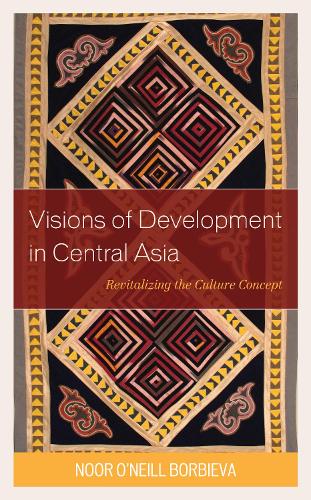
Visions of Development in Central Asia: Revitalizing the Culture Concept
(Paperback)
Available Formats
Publishing Details
Visions of Development in Central Asia: Revitalizing the Culture Concept
By (Author) Noor ONeill Borbieva
Bloomsbury Publishing PLC
Lexington Books
21st October 2021
United States
Classifications
Professional and Scholarly
Non Fiction
Social and cultural anthropology
306.095843
Physical Properties
Paperback
254
Width 153mm, Height 230mm, Spine 16mm
408g
Description
In Visions of Development in Central Asia: Revitalizing the Culture Concept, Noor ONeill Borbieva reflects on anthropologys withdrawal from discussions about culture and the parallel rise of the intellectually and politically problematic discourse of culture matters thinking, or CMT. CMT asserts that cultures are homogeneous and that the dominant values of its culture determine a states socioeconomic and political trajectories. Drawing on practice theory, ecological psychology, complexity science, and poststructuralism, Borbieva urges anthropologists to revisit debates about culture in order to counteract the influence of simplistic formulations such as CMT. Through an examination of ethnographic material from Kyrgyzstan, gathered during the years she worked as a Peace Corps Volunteer and as an anthropologist, Borbieva examines how debates about culture shaped the development sectors agenda in Central Asia. She argues that mainstream discussions of culture not only misunderstand the cultural basis of human diversity but also threaten that diversity by promoting a one-size-fits-all vision of well-being. Borbieva suggests an alternative vision, one that recognizes the profound complexity of human sociality and embraces the many forms of human thriving that grow out of our cultural differences.
Reviews
This timely and challenging book by Borbieva (Purdue Univ., Fort Wayne) asks readers to consider how debates over the nature of culture have determined anthropological thinking about the politics of development in Central Asia. Borbieva focuses on what she terms "culture matters thinking" (CMT), an approach suggesting that cultures are homogeneous and that a culture's sociopolitical future is largely based on its dominant values. Her extensive experience in the development field in Kyrgyzstan, coupled with her evident affection for and understanding of the country and its people, makes this a powerful and important book for understanding the impact of external opinions and philosophies on society. The first two chapters present a description of Central Asia and the author's own experiences of the region. Chapters 3 and 4 address the nature and implication of CMT, while chapter 5 discusses various theoretical approaches to culture. Chapter 6 offers an ethnographic account of Kyrgyzstan's 2005 election. Both the conclusion and the afterword challenge the reader to reconsider aspects of cultural anthropology and human development. . . this book is well researched and intellectually enjoyable.
Summing Up: Recommended. Graduate students, faculty, and professionals.
Visions of Development in Central Asia assesses the realities of aid in Central Asia. It explores the relationship between culture and development as well as the interaction between the West and local cultures by applying various ideas regarding the social, political, and economic development in local conditionsin this case in Kyrgyzstan. The author's voice is a valuable contribution to the discussion of the perception of non-European cultures by scholars and development practitioners. It demonstrates how various theories of development determine the thinking of practitioners implementing development programs, affect the interaction between Western aid workers and local actors, and determine aid effectiveness. -- Anna Cielewska, Jagiellonian University
Author Bio
Noor ONeill Borbieva is associate professor of anthropology at Purdue University Fort Wayne.
